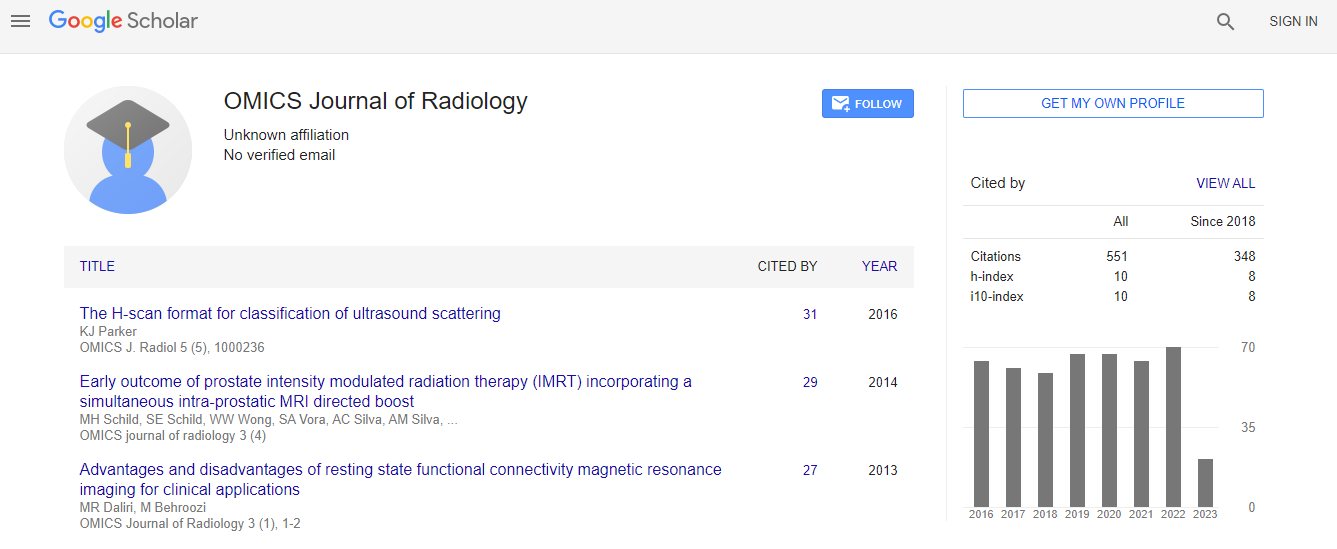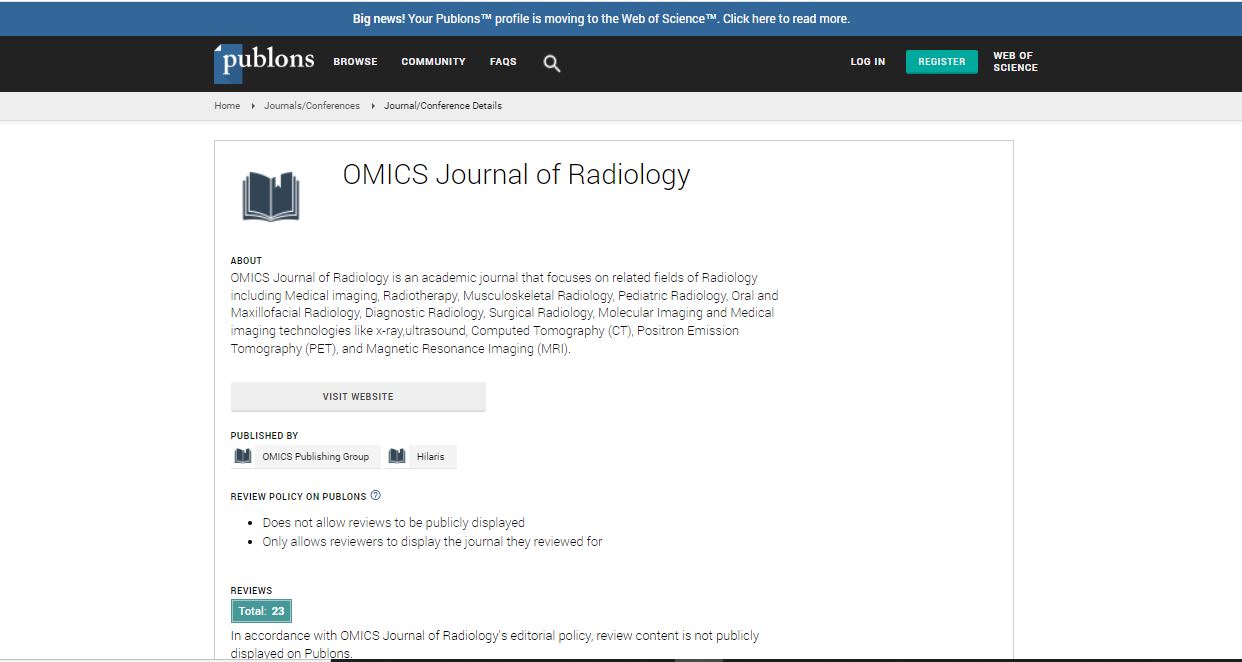Our Group organises 3000+ Global Conferenceseries Events every year across USA, Europe & Asia with support from 1000 more scientific Societies and Publishes 700+ Open Access Journals which contains over 50000 eminent personalities, reputed scientists as editorial board members.
Open Access Journals gaining more Readers and Citations
700 Journals and 15,000,000 Readers Each Journal is getting 25,000+ Readers
Google Scholar citation report
Citations : 551
Journal of Radiology received 551 citations as per Google Scholar report
Journal of Radiology peer review process verified at publons
Indexed In
- Index Copernicus
- Google Scholar
- Open J Gate
- Genamics JournalSeek
- ResearchBible
- Electronic Journals Library
- RefSeek
- Hamdard University
- EBSCO A-Z
- OCLC- WorldCat
- SWB online catalog
- Virtual Library of Biology (vifabio)
- Publons
- Geneva Foundation for Medical Education and Research
- ICMJE
Useful Links
Share This Page
The use of abdominal X-rays film in the emergency department of Ysbyty Gwynedd NHS Hospital
2nd World Congress on Medical Imaging and Clinical Research
Amjed Eljaili
Ysbyty Gwynedd, UK
ScientificTracks Abstracts: OMICS J Radiol
Abstract
The audit was carried out to exercise the compliance of the emergency department at Ysbyty Gwynedd, in relation to the standards guidelines of I-Refer and the royal college of radiologist (RCR), in order to ensure that the plain abdominal films are performed appropriately since it was noted that a significant numbers of abdominal X-rays are not clinically indicated or justified. Adherence to the recommended guidelines surely helps reducing the unnecessary radiation dose exposure directly toward sensitive and soft abdominal organs and genitalia, also that will facilitate accessing more relevant imaging quicker into the way of establishing the diagnosis of the patient√ʬ?¬?s clinical problem. Abdominal X-rays is considered as high radiation dose study, and below is highlighting√ʬ?¬?s of few examples in comparison to the abdominal radiograph radiation dose, 1. Chest X-Ray: 0.1mSv (10 days background radiation). 2. CT head 2.0mSv (8 months background radiation). 3. Abdominal X ray 8.0mSv (3 years background radiation). 4. CT Abdomen and Pelvis 10mSv (3 years background of radiation). 5. CT chest 7mSv (2 years background of radiation). The audit has also covered few other aspects in terms of film quality and request form adequacy as beside proper indication of the abdominal radiograph. The breakdown of the abnormal results illustrated by the radiology reports also has been mentioned, generally speaking, faecal loading represents the majority of that. I-Refer/ RCR Standards guideline The indications for requesting abdominal X-rays film, including: 1. Clinical suspicion of perforation or obstruction 2. Acute exacerbation of inflammatory bowel disease 3. Palpable mass (specific circumstances) 4. Constipation (specific circumstances) 5. Acute and chronic pancreatitis 6. Sharp/poisonous foreign body 7. Smooth and small foreign body, e.g., coin (specific circumstances) 8. Blunt or stab abdominal injury Abdominal radiograph is not indicated routinely in the following conditions unless otherwise in very specific circumstances by specialist, pancreatitis, biliary Colic, constipation and GI Bleed. Aim of the Audit: To audit our compliance in Ysbyty Gwynedd Hospital, emergency department, in adherence to the RCR/I-Refer standards guidelines and to increase the awareness of the healthcare staff in Ysbyty Gwynedd in relation to correct and appropriate indications of abdominal X-ray films, in so doing that will reduce to unnecessary radiation dose the patient will expose to. 2- To improve √ʬ?¬?the optimization of abdominal radiographic imaging in the emergency department in order to allow easy and correct interpretation of the radiograph film. Methodology: This was a retrospective study involved data collection of 60 patients that were audited over period of two-months for each cycle (Nov/December 2016 to March and April2017) to assess the compliance with the I-refer/RCR guidelines and also to optimise the film quality and the adequacy. The 60 consecutive abdominal X-rays requested in the emergency department where looked at their indication, radiology report, request form adequacy, radiograph quality and the clinical question need to be answered. The patient√ʬ?¬?s information was obtained via using radiology information system for radiology reports/requests form and emergency department admission case cards. Discussion and recommendations of the audit: It was noted that during the first the study, some abdominal radiographs were requested inappropriately for the following conditions, constipation, hemorrhoid, PR bleed, Upper GI bleed, ascites, bladder symptoms and UTIs, scrotal pain, appendicitis, gastroenteritis and acute cholecystitis, however majority of the films were requested by the most junior doctors particularly those who had recently completed a surgical placement. The junior doctors who newly started emergency medicine placement were educated and advised always not to hesitate to ask for senior opinion regarding requesting abdominal films when not sure whether or not indicated, also the majority of cases where bowels obstruction suspected have not had direct rectal examination performed as part for the NICE guideline for patients presenting with abdomenal pain. Conclusion: Abdominal radiograph is of high radiation dose and usually has low diagnostic value in the majority of the cases, direct rectal examination is good practice and part of the recommended NICE guideline in the context of abdominal pain and bowel obstruction. Abdominal X-rays are not indicated for non-specific abdominal pain.Biography
Amjed Eljaili, MBBS, October 2010, University of Al-Zaiem Al-Azhari, Sudan, currently practicing in UK, Ysbyty Gwynedd, BCUHB, Intensive care unit, Surgical department Dr Eljaili has attended several academic meetings regionally and nationally also he has participated in various national work-shops, congress. participation and membership with British institute of Radiology, United Kingdom.

 Spanish
Spanish  Chinese
Chinese  Russian
Russian  German
German  French
French  Japanese
Japanese  Portuguese
Portuguese  Hindi
Hindi 
